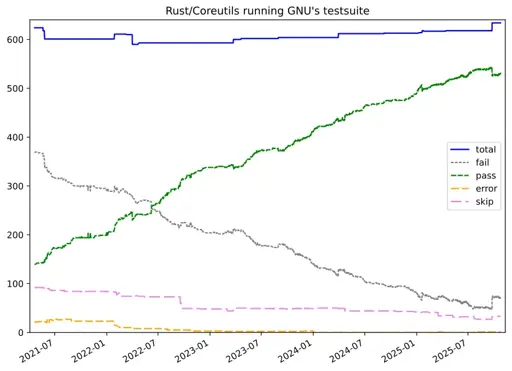The uutils project announced tonight the release of Rust Coreutils 0.3, another step forward for this Rust version alternative to GNU Coreutils that has been attracting a lot of interest lately due to Ubuntu 25.10 now using it by default.
Rust Coreutils 0.3 brings improved GNU test suite compatibility with now passing 532 tests, or nearly an 84% pass rate. There is improved error handling and other updates to better match the behavior of GNU Coreutils… Such as the recently noted date issue breaking Ubuntu 25.10’s unattended upgrades.



You are fixating on the incorrect premise. I noted that it was started a decade ago as a analogy for how labor intensive the project is. A project that by design has to mirror the behaviour of coreutils.So why are people investing the time in this? What makes it worthwhile? It’s the permissive license. If uutils used GPL individuals would instead try to contribute to the much more utilised coreutils, where their contributions would be guaranteed to have an impact.
Edit: Some of the earlier issues date from 2013, so it has been a decade, although it probably was very obscure at the time.
So the fact that it is written in Rust has absolutely nothing to do with it?
Being written in Rust has mixed effects. Rust is still less mainstream than C, so fewer people can contribute. However, it does attract more interest because it’s different.
However, the reasons why you create/contribute to new-but-similar projects is to add functionality that the original project doesn’t have. By nature a coreutils replacement has to behave like coreutils or else it will break many configurations. This severely limits the functionality you can provide. So why are people (and Canonical) contributing so much labor to something that still doesn’t function as intended?
I say it’s the licensing. I say this as someone who regularly gets requests to change the licensing of my software (more than any feature request). I think licensing is a big deal, and most software devs recognize that.
Yes, it’s “different”. That is all that it has to offer: it’s “different”. There is no other reason why people might be interested in it.
Why is that the only reason to motivate someone to do such a thing?
Maybe we should take them that they word that they are genuinely think that coreutils would be better if it were written in Rust? Why is that such a radical possibility?
Yes, I have noticed that you are very big on saying what others’ motivations are.
“Take them at their word”
Who? Has there been a survey of contributors?
“Genuinely think that coreutils would be better if it were written in Rust”
I feel like the skill-level of the contributors is high enough that they would not be so naive.
Programs in different languages can compile to the same machine code. Any advantage would be in language constructs. But if you already have an existing C implementation what advantage do you do from a Rust implementation?
I personally write in 3 languages: Rust, C++, and Fortran ( or rarely SPARK). I don’t port my code across languages, because there is no advantage. If I wanted it better, I would work on my existing codebase.
Porting really only helps if the original language was hindering development, deployment or runtime. These arguments don’t really hold with C, a fast, low-dependency language that is more widely used than Rust.